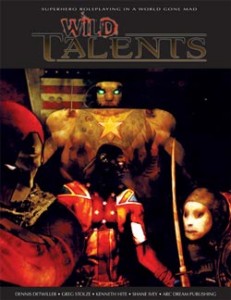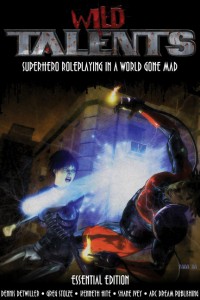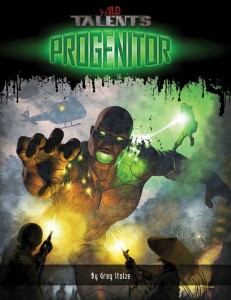Wild Talents: All Too Superhuman
Arc Dream Publishing's superhero RPG Wild Talents has always been about the gamers who love our work. It's built to allow you to create not just an infinite variety of superpowers, but to create the very "rules" of the game world itself that give rise to those powers. And it's built explicitly to do all that while delivering a particularly suspenseful kind of game play. Characters are more physically vulnerable than in most superhero RPGs, and they are deeply affected by Motivations that affect their ability to use superpowers. Wild Talents is not just about whether your character can beat another super-character in a super-brawl. It's even more about your motivations for pursuing that brawl and what you put at risk to achieve great things.
The Origin Story
Longtime Arc Dream fans remember when the idea for it first appeared in 2002, when Dennis Detwiller conceived it as a supplement for Godlike. It was meant to explore that game's setting after World War II when the "rules" for superhuman powers began to change and stranger and stranger Talents appeared. At the same time we heard one demand from gamers above all others: to open up the rules for Godlike to accomodate other settings and other approaches to superpowers. Those goals fit each other well. But more than that, they demanded not just a Godlike supplement but a new set of rules that allowed gamers to start from scratch to develop the world and the rules themselves to suit exactly the games they had in mind. To this day, that's what Wild Talents is all about.
 While Godlike was still new, Dennis began public brainstorming on an open Yahoo! group to develop and refine the new rules for Wild Talents. He started with the rules for superpowers that he and Greg Stolze had developed for Godlike and reverse-engineered many of them to allow players to tinker with them and put them back together in new ways. That became the first edition of Wild Talentsin 2006, published in a hardback limited to 1,000 copies. As soon as it appeared, we began refining the system further based on feedback from gamers.
While Godlike was still new, Dennis began public brainstorming on an open Yahoo! group to develop and refine the new rules for Wild Talents. He started with the rules for superpowers that he and Greg Stolze had developed for Godlike and reverse-engineered many of them to allow players to tinker with them and put them back together in new ways. That became the first edition of Wild Talentsin 2006, published in a hardback limited to 1,000 copies. As soon as it appeared, we began refining the system further based on feedback from gamers.
In 2008, I flew up to Vancouver to visit Dennis and his wife Hilary for a long working weekend. Dennis and I hammered out the final shape of the Wild Talents rules in marathon sessions in coffee houses and in walks around the city. That resulted in superpowers rules that were stripped down as far to their essence as we could conceive.
Building Your Powers
Godlike's rules had already been impressively flexible and customizable, with each power defined by four basic questions: Can it attack? Can it defend? Is it useful outside of combat? Is it robust enough to keep working despite distractions? A custom power started there and then could be further refined with extras and flaws. With the new edition of Wild Talents we defined each of those qualities (Attacks, Defends, Useful) as its own discrete power with its own set of extras and flaws; they can be combined and mixed for power suites however you like. We removed the Robust quality and made it an optional flaw—it made sense as an inherent quality of superpowers only inGodlike, where powers are psychic in nature and easily thwarted.
 And we developed a few new approaches to powers that allowed gamers to apply that supreme flexibility during play, not just during character creation: Variable Effect, Interference, and Augmentation. These are extras that enhance individual powers, but they have profound effects on game play because they alter the way that powers interact with the core rules of the game. That makes them the hardest part of the rules for players to figure out, which is why we explicitly encourage readers to get plenty of experience playing the game before messing with them too much.
And we developed a few new approaches to powers that allowed gamers to apply that supreme flexibility during play, not just during character creation: Variable Effect, Interference, and Augmentation. These are extras that enhance individual powers, but they have profound effects on game play because they alter the way that powers interact with the core rules of the game. That makes them the hardest part of the rules for players to figure out, which is why we explicitly encourage readers to get plenty of experience playing the game before messing with them too much.
And that's instructive about Wild Talents. It's built on the One Roll Engine rules that made Godlike's style of play unique. The potential dissonance between declared actions and the unpredictability of the dice, and the vulnerability of characters to even mundane weapons and threats, make every encounter and challenge truly suspenseful. But unlike Godlike, which has superpowers rules that are keyed to a very specific setting with very specific metaphysics, Wild Talents is built to allow you to create your setting and its metaphysics from scratch. That kind of flexibility means complexity. It's challenging. But like most challenges, the struggle to master it can yield pure brilliance.
Super Settings
You can see that in the setting books that Wild Talents inspired. The Kerberos Club, with its disreputable superhumans changing the culture of Victorian London. Grim War, where classic superheroes clash with secretive spirit-summoning sorcerers. This Favored Land, which puts Godlike-style superhumans in the U.S. Civil War.eCollapse, where cyberpunk superpowers help desperate people get ahead in a thoroughly dystopic future.Progenitor, where superheroes create their own nemeses because using superpowers causes others to get superpowers of their own, and which includes rules for even modest superhuman player characters to change the course of the Twentieth Century. And of course there's the "World Gone Mad," the setting presented in the Wild Talents hardcover rulebook, which takes the world of Godlike and extends it through the rest of the Twentieth Century and into the Twenty-First, with the increasing prevalence of superpowers wreaking greater and greater changes in the world.
 Each of those settings is built on the notion of presenting superhuman characters as first and foremost human. Characters inWild Talents are affected primarily by the Motivations that are defined for each character at the outset. Despite all their power, they (and, just as important, their loved ones) are immediately vulnerable to the dangers of the world around them. Each of those amazing settings uses the flexibility of the Wild Talents rules to present superpowers that are stranger and stranger, but that nevertheless always bring game play back to the same core issues of motivation, unpredictability, and suspense.
Each of those settings is built on the notion of presenting superhuman characters as first and foremost human. Characters inWild Talents are affected primarily by the Motivations that are defined for each character at the outset. Despite all their power, they (and, just as important, their loved ones) are immediately vulnerable to the dangers of the world around them. Each of those amazing settings uses the flexibility of the Wild Talents rules to present superpowers that are stranger and stranger, but that nevertheless always bring game play back to the same core issues of motivation, unpredictability, and suspense.
I haven't even touched on my personal favorite part of Wild Talents, "Building Superheroic Histories" by Kenneth Hite. That chapter presents a system for creating an alternate history in a superheroic world that holds together within its own logic. Ken came up with an ingenious four-color axis to measure the way superpowers affect your world. Red represents historical inertia—the higher the Red value, from one to five, the less the course of history changes. Gold represents Talent inertia—the higher the Gold, the less superpowers themselves change over time. Blue represents "the lovely and the pointless," a measure of the bizarre and wondrous things that crop up in a world with superpowers—the higher the Blue, the weirder the world becomes. Black represents moral clarity—the higher the black, the easier it is to tell good from evil in your world. By dialing each of those axes up and down and paying attention to Ken's insights you can develop an alternate history that has depth and resonance.
I don't mind saying that I am deeply proud of the work we put into Wild Talents, and of the way it works at the game table and in gamers' imaginations. Wild Talents seems to really click with gamers who share our interest in characters that have substance to go with their superpowers—characters who are defined not by the abilities on the character sheet but by the choices they make and the risks they take in play. I would love to hear how it's worked for you.
For a scant few weeks in July and August 2013, Wild Talents Second Edition, the stripped-down Essential Edition, and the Wild Talents setting books are all available at 30% off. Use the discount code "3013" during checkout.You'll get the PDF verison of every book as a free instant download after you order it in print. This is a great time for your game group to stock up and prepare for some powerful and dangerous superhero action.
Shane Ivey, Arc Dream Publishing
The One Roll Engine and more: www.arcdream.com
You received this message because you are subscribed to the Google Groups "Cult of ORE" group.
To unsubscribe from this group and stop receiving emails from it, send an email to cult-of-ore+unsubscribe@googlegroups.com.
To post to this group, send email to cult-of-ore@googlegroups.com.
Visit this group at http://groups.google.com/group/cult-of-ore.
For more options, visit https://groups.google.com/groups/opt_out.






0 comments:
Post a Comment